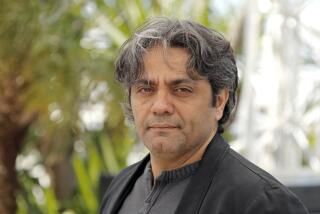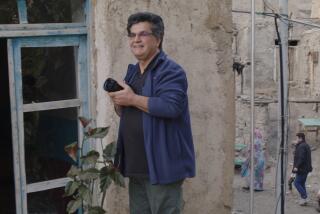Acclaimed Iranian filmmaker arrested in late-night raid
Reporting from Dubai, United Arab Emirates — One of Iran’s most acclaimed film directors has been detained amid an ongoing government crackdown against the opposition, an official said Tuesday.
Jafar Panahi, an award-winning director of neorealist films exploring Iran’s social topography, along with his wife, 20-year-old daughter and 15 guests were reportedly arrested at his home Monday night in murky circumstances under unspecified charges.
Among the guests, according to the reformist news website Aftab, were documentary filmmaker Mohammad Rasoulof and his cameraman.
The director’s son, Panah Panahi, told the opposition website Rahesabz that security personnel confiscated computers and other personal property.
According to Aftab, neighbors called police after learning that a group had forced its way into the Panahis’ home, but officers said they couldn’t do anything because the plainclothes forces conducting the raid were connected to “security and intelligence organs.”
Jafar Panahi, like many Iranian artists, is a staunch supporter of the peaceful protest movement that emerged after the disputed reelection of President Mahmoud Ahmadinejad in June. The filmmaker joins the ranks of hundreds of activists, journalists, students and political leaders labeled “rioters” or “counterrevolutionaries” by authorities, tossed into prison and subjected to interrogations.
Panahi and his daughter were briefly detained July 30 during mourning ceremonies marking the 40th day after the death of Neda Agha-Soltan, a protester who became a cause celebre after images of her slaying taken by cellphone were released around the world.
But Tehran chief prosecutor Abbas Jaafari Dowlatabadi said Panahi’s detention, based on a court order, had nothing to do with his political views.
“His arrest is neither related to his profession as an artist nor linked to political motivations,” he said, according to state radio. “He is only suspected of committing certain offenses.”
Dowlatabadi said the 49-year-old director’s interrogation “has just begun.”
Another news source, the website Tabnak, quoted an “informed source” as saying that Panahi and colleagues allegedly were collaborating with foreigners and opponents of the Iranian establishment to make an underground “anti-system” movie that was to air overseas but “were arrested by security forces in a sting operation.”
The source alleged that Panahi had turned his house into “a safe haven” for producers of films “serving the objectives of seditionists,” a reference to the protest movement.
Panahi’s son said in a message posted to his Facebook account that his father’s arrest was “based on false accusations relating to threatening national security.”
A veteran of the Iran-Iraq war who served as an assistant to the famed Iranian director Abbas Kiarostami, Panahi directed movies critically acclaimed internationally but either banned or granted limited showings inside the country. They often employ nonprofessional actors and tread the line between fiction and documentary.
His 2000 film “The Circle” traced the lives of women suffering solely because of their gender. “Crimson Gold,” released in 2003, profiled a mentally disabled Iran-Iraq war veteran and pizza deliveryman navigating the social and economic minefields of Tehran in an attempt to better his life. It starred a nonprofessional actor who suffers from schizophrenia.
The 2006 film “Offside” followed a group of young women trying to enter a soccer match despite a ban prohibiting females from going into the stadium.
A Foreign Ministry spokesman in France, where Panahi has twice been recognized for his work at the Cannes Film Festival, condemned “the harassment of members of the Iranian opposition and civil society” in response to the arrest, according to Agence France-Presse.
More to Read
Sign up for Essential California
The most important California stories and recommendations in your inbox every morning.
You may occasionally receive promotional content from the Los Angeles Times.










